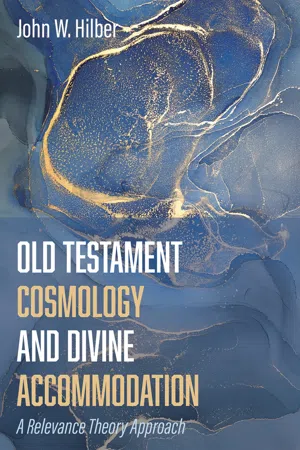![]()
1
Reading with Relevance Theory
Communication and Context
Once, on my way out of seminary chapel, I said to a colleague, “I’m going to keep the doctor away.” Simultaneously, I held out the apple that was in my hand. My informative intention was reinforced by the fact that chapel lets out just before lunch. My meaning was “I’m going to eat an apple now for lunch.” Effective communication depended on three factors in this context: (1) the shared knowledge in our institution that people often eat lunch immediately after chapel, (2) the visual object to which I drew my friend’s attention, and (3) the shared knowledge of a commonly known proverb for which he needed to supply the first half.
Now, if the chapel sermon just heard had been about the efficacy of prayer and fasting for healing, my friend might have concluded that I was going off to pray (to keep the doctor away) instead of eating lunch immediately. Perhaps my lifting the apple was a gesture to offer it to my friend to eat, since I was going to fast (the opposite meaning from the previous paragraph). If my friend had not been familiar with the proverb “An apple a day keeps the doctor away,” he would surely have missed the possibility that my words had anything to do with eating an apple. Awareness of context really matters! But in this case, the chapel message was not in any way associated with healing or eating.
More subtle is how my comment related to a discussion in faculty meeting the previous day on the relative importance of backgrounds outside of the biblical text for accurate interpretation. My comment was immediately understood as continuing that discussion, and it left no doubt in my colleague’s mind as to where I weighed in on that issue. The communication process he just experienced validated the importance of background assumptions and so conveyed my sentiments. We shall return to this illustration below to consider how listeners overlook trivia in order to maximize the benefit of what they hear.
Communication is a very complex affair, dependent on more than dictionary definitions and matters of grammatical syntax. Understanding a speaker or author necessitates more than linguistic competence; it also requires some knowledge of the cultural and often the situational context that clarifies and enriches the meaning of an utterance. The above example illustrates how assumptions shared between my colleague and me were cultural (a proverb), situational (time of day, a visual object), and dependent on memory (a recent faculty discussion). The fact that this discussion was particularly important to the both of us was also a factor. Furthermore, it required that my colleague make the right connections between all of these elements in order to infer my informative intention. There was nothing in the words of my utterance that conveyed my meaning without the enrichment from cultural and situational context as well as shared interest. All of this demonstrates how effective communication operates through expected inferences from shared context. Many linguists working on the pragmatic side of communication use what is termed “relevance theory” to explain how this interpretive process operates.
Relevance Theory: An Introduction
Moving beyond the Code
Even though extrabiblical context has always been acknowledged in hermeneutics, the methodological emphasis in the past has focused primarily on semantics and grammar. This is perhaps due to the fact that until the 1950s, communication theory in general worked with a code model that attended to grammatical syntax and to the semantics of words that could be interpreted by dictionary reference. But this did not account well for nonpropositional uses of language (e.g., warnings or questions) or for extratextual effects, such as how the text interacts with material or cultural background.
One successful effort to move beyond the code model is speech-act theory. Theorists noted that the code model alone could not account for a speaker’s intention, i.e., the full meaning of the discourse, which includes not just the...
